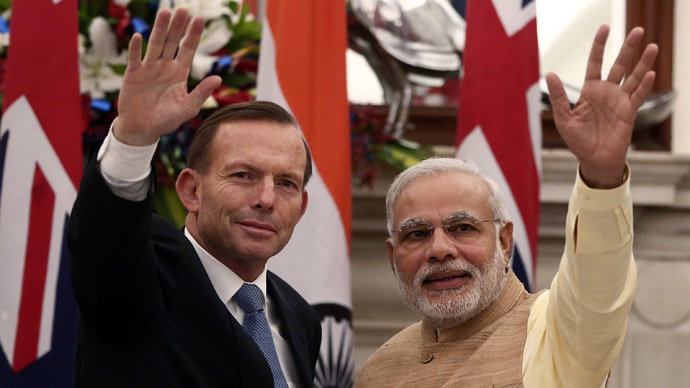Shifty Australia dumps Russia, embraces India for nuclear deal

Australia has just dumped Russia and embraced India in a uranium export deal that is seen as a shift in diplomacy.
Interestingly, Australia signed the nuclear deal with India at a time when it had just cancelled its uranium sales pact with Russia. Australian Prime Minister Tony Abbott did not hold his punches vis-a-vis Russia when he went on record telling the Australian Broadcasting Corporation on 2 September: "Australia has no intention of selling uranium to a country which is so obviously in breach of international law as Russia currently is … If we are prepared to sell uranium to Russia, and we've been prepared to do that in the past, surely we ought to be prepared to provide uranium to India under suitable safeguards.”
Australia has been rather shifty in some of its major foreign policy decisions. Under pressure from China in 2007, Australia had withdrawn from the strategic quadrilateral comprising Japan, US, Australia and India. Now under pressure from the US-led Western community, Australia has cancelled its uranium exports to Russia.
Australia is already trying to block the participation of Russian President Vladimir Putin in the upcoming G20 meeting in Brisbane in November. The issue came up for a discussion at the NATO summit in Wales on 4-5 September, though the main talking points of the summit were developments in Ukraine, Iraq and Syria.
Because Australia by itself cannot decide on excluding any member from the Brisbane summit and because G20 has no rules on revoking membership and decides mainly by unanimity, Australia may try to cobble up “unanimity” of the rest of the G20 members to keep Russia out of the Brisbane summit.
Australia-India bonhomie
Australia is making a concerted effort to reach out to all the major powers to increase its strategic footprint wherever it matters most. No surprise then that Canberra is wooing India like never before.
Australian Prime Minister Tony Abbott came to India on a state visit – the first state visit to India by a foreign leader since the government of Prime Minister Narendra Modi took over on 26 May. Modi will be travelling to Australia to attend the G20 summit in Brisbane on 15-16 November where he will be having a bilateral meeting with his Australian counterpart. This will be first visit by an Indian Prime Minister to Australia in 28 years.
This is the first time the prime ministers of India and Australia have visited each other’s countries in a single year.
The high point of Abbott’s state visit to India has become the signing of the uranium export deal. Before embarking on his India visit, Abbott told his parliament on 3 September that he would sign a nuclear cooperation agreement with India, thus bringing closure to an important aspect of bilateral relations that the two sides had been negotiating for two years, and have had five rounds of discussions on this so far.
So now Japan is the only major power in the world with which India has yet to sign an agreement on cooperation in the civilian nuclear field. The done deal with Australia will inevitably exert pressure on Japan. The much-awaited India-Japan nuclear deal could not be signed during Modi’s just-concluded visit to Japan as apparently Tokyo still needs more time and space to ink this crucial agreement with India.
In 2007, under pressure from China, Australia had unilaterally killed the strategic quadrilateral. Now, under pressure from the US, it has cancelled its uranium deal with Russia. I asked Sanjay Bhattacharya, joint secretary (South) in the Ministry of External Affairs, about Australia’s shifty diplomacy and whether Australia will have some protective measures with regard to its nuclear deal with India.
“I think we’d recognize that there is a dynamic in the Asia-Pacific region and we recognize Australia as an emerging player in this area. We’ve, therefore, established strategic partnership with Australia in 2009. We wish to build to our relations further with Australia, as we do with many other countries. So we will continue to build and strengthen our partnership with Australia,” Bhattacharya said.
Russia, India need to take their strategic partnership on global plane
It is unlikely that Australia’s unilateral cancellation of uranium export to Russia came up for discussion when Abbott held talks with his Indian colleagues.
But if India and Russia are to have a meaningful strategic partnership, it should encompass the whole globe. Both friends should take up with third countries those issues affect them badly. But then such things normally do not take place in international diplomacy unless the two sides concerned make a conscious policy decision.
Perhaps it is time for the two traditional friends India and Russia to think out of the box and take up each other’s interests with third nations. It will be only then that the two friends will have a true strategic partnership on the global plane.
The statements, views and opinions expressed in this column are solely those of the author and do not necessarily represent those of RT.
The statements, views and opinions expressed in this column are solely those of the author and do not necessarily represent those of RT.













